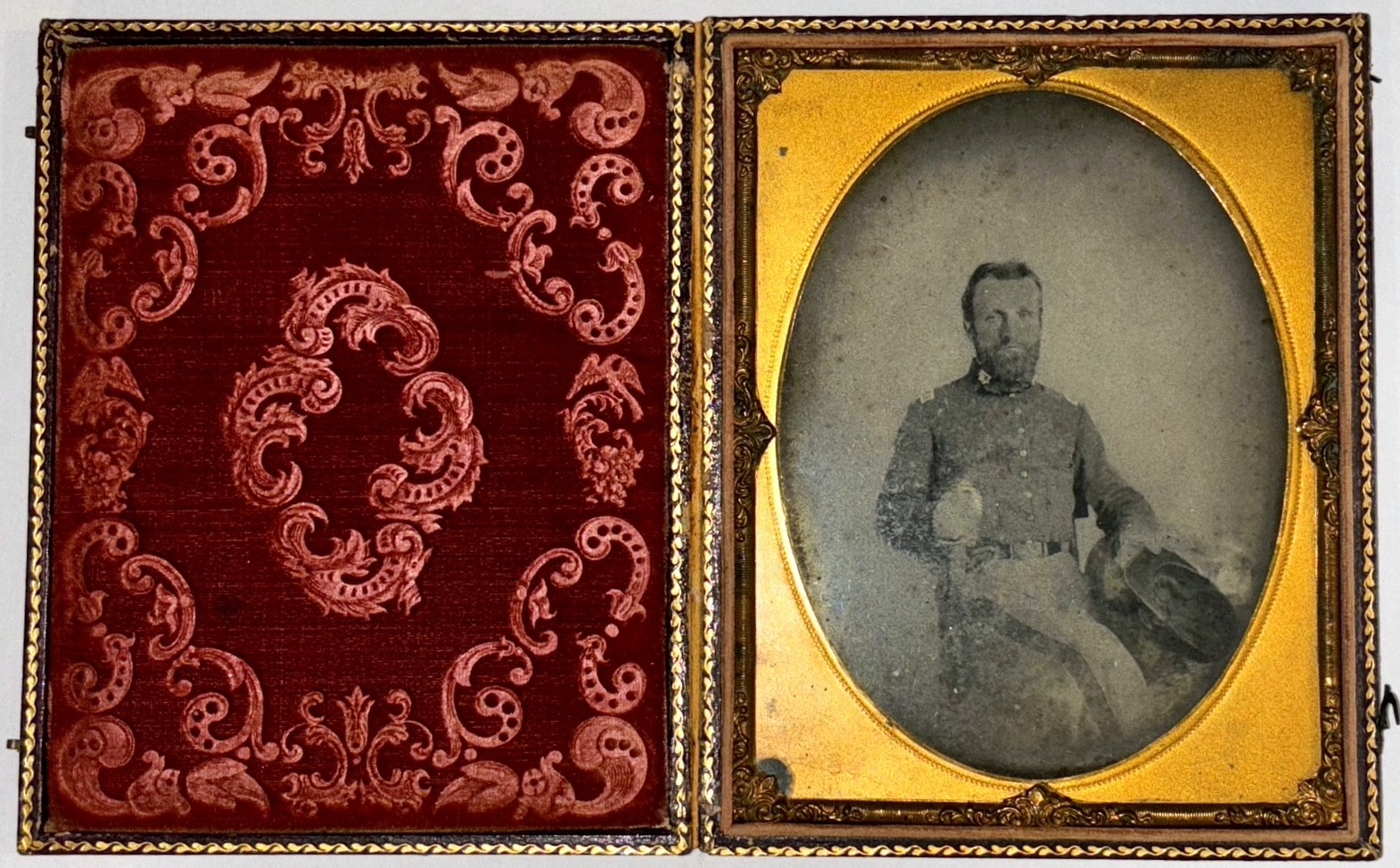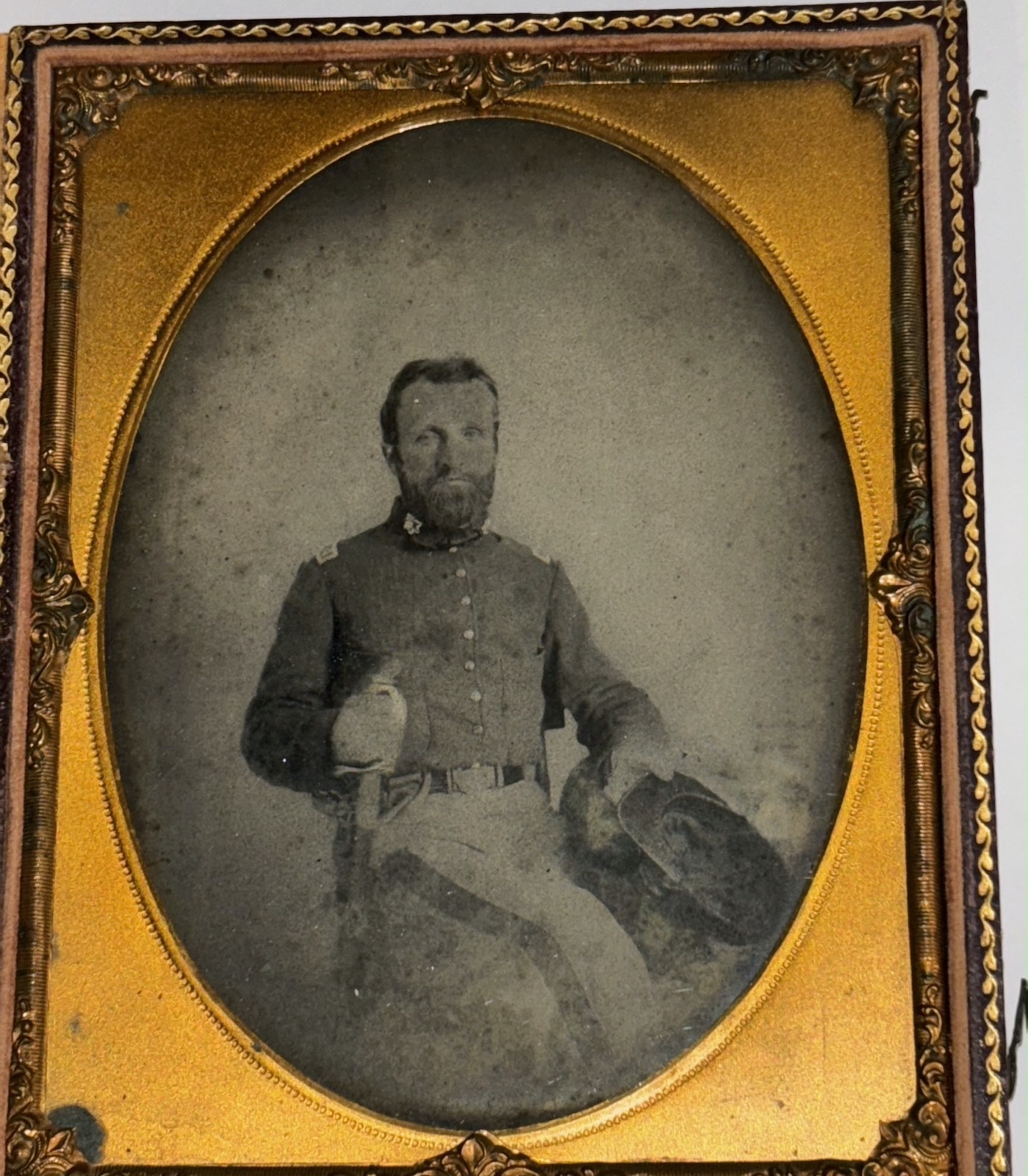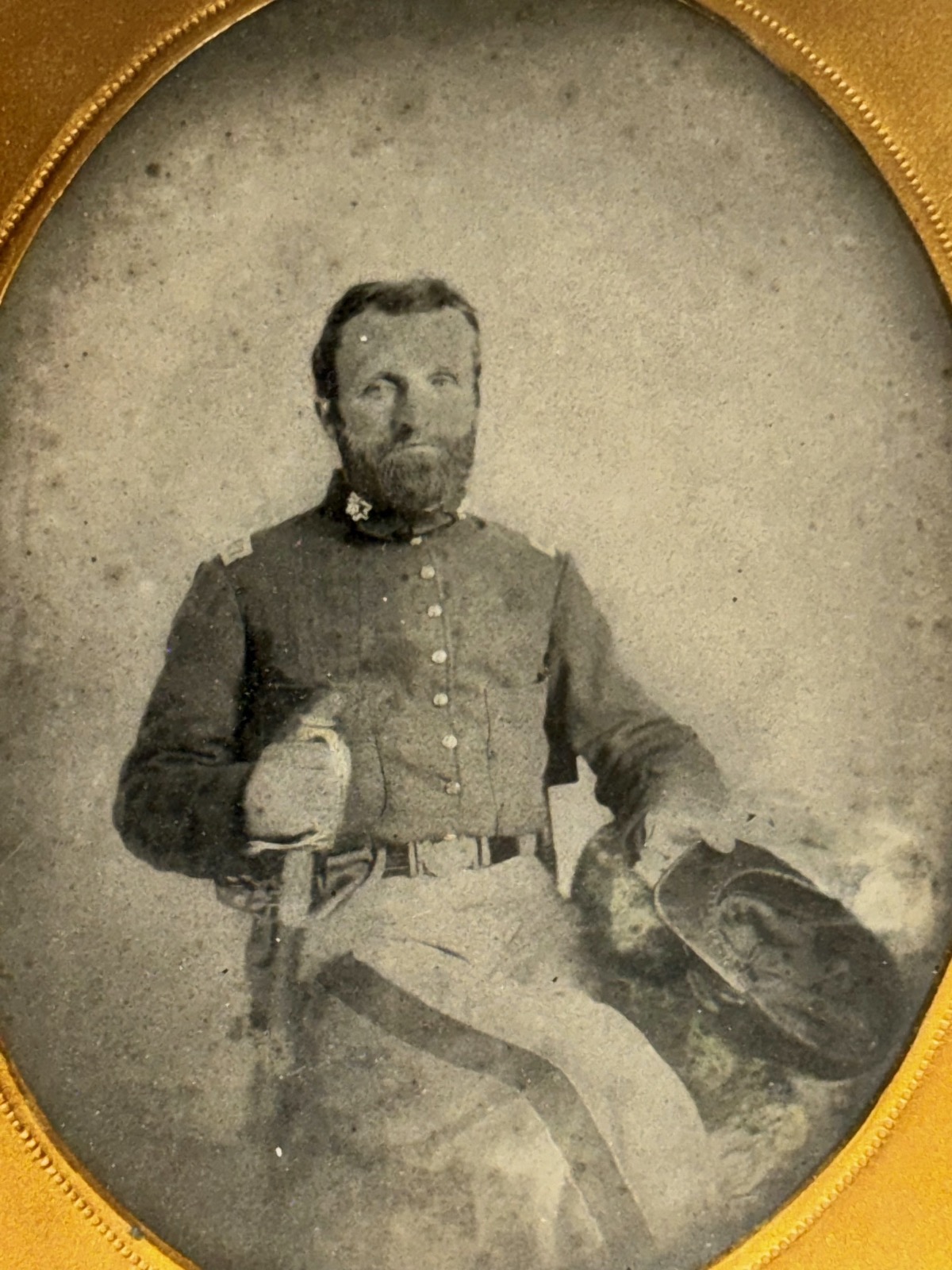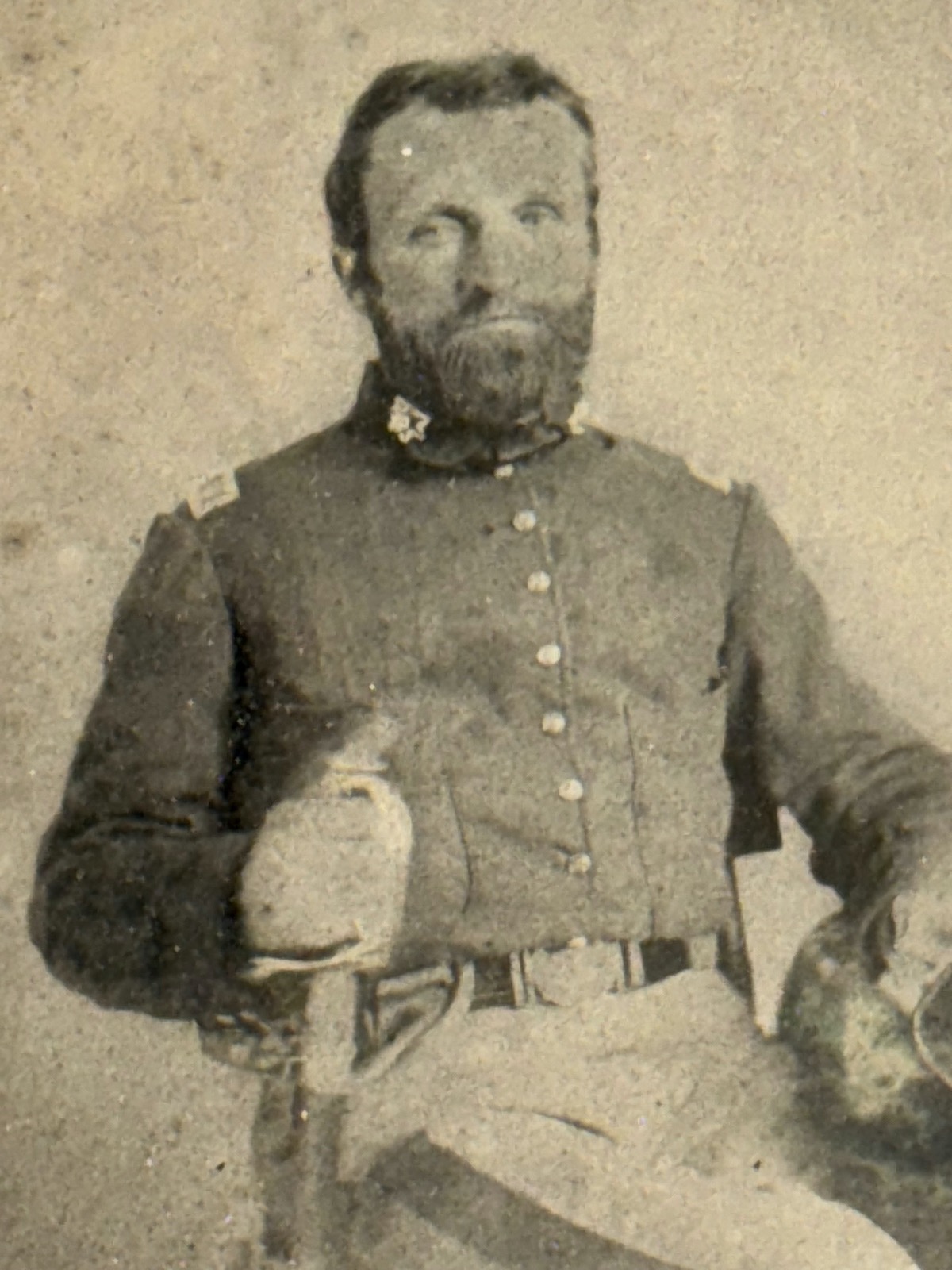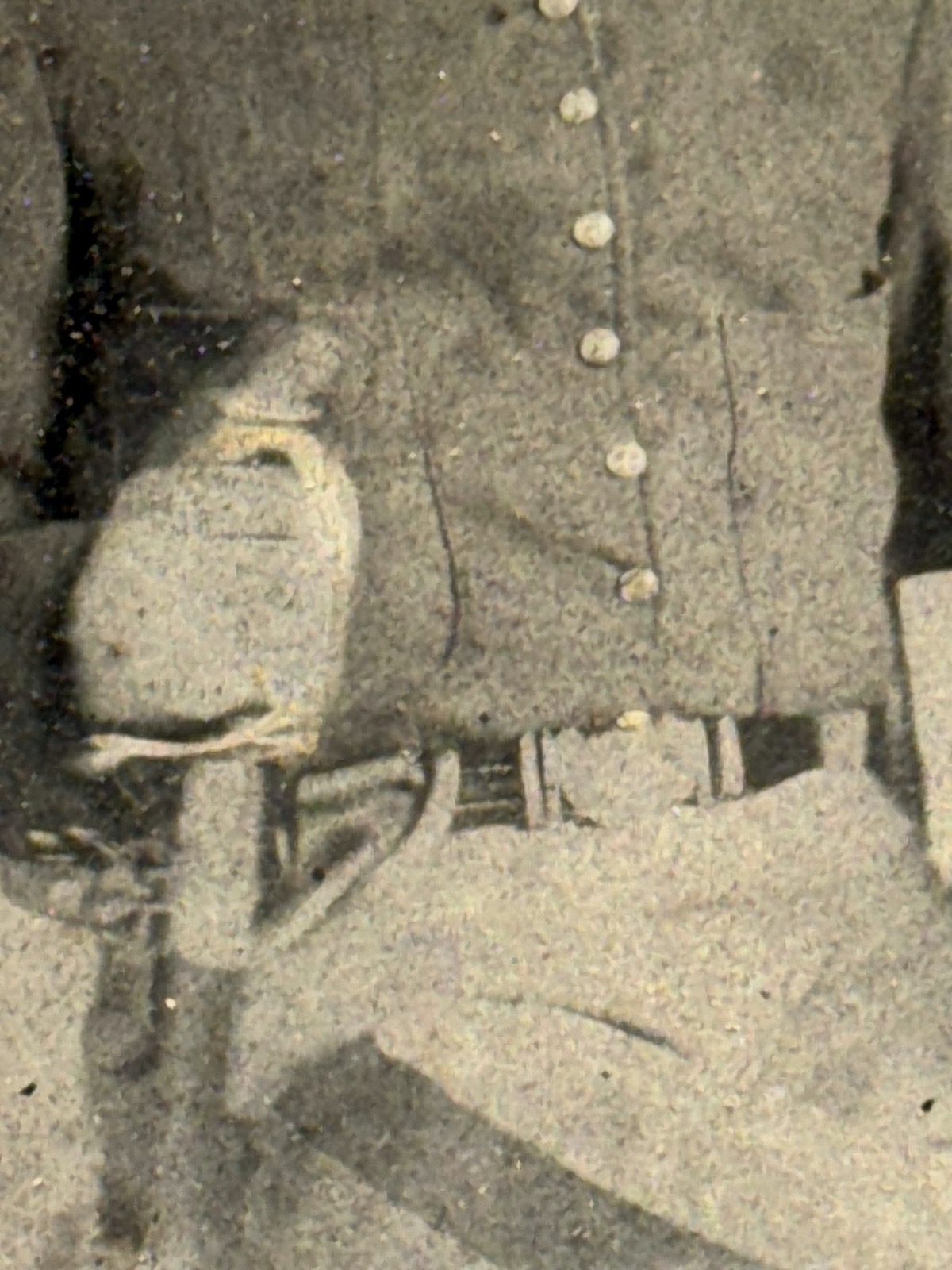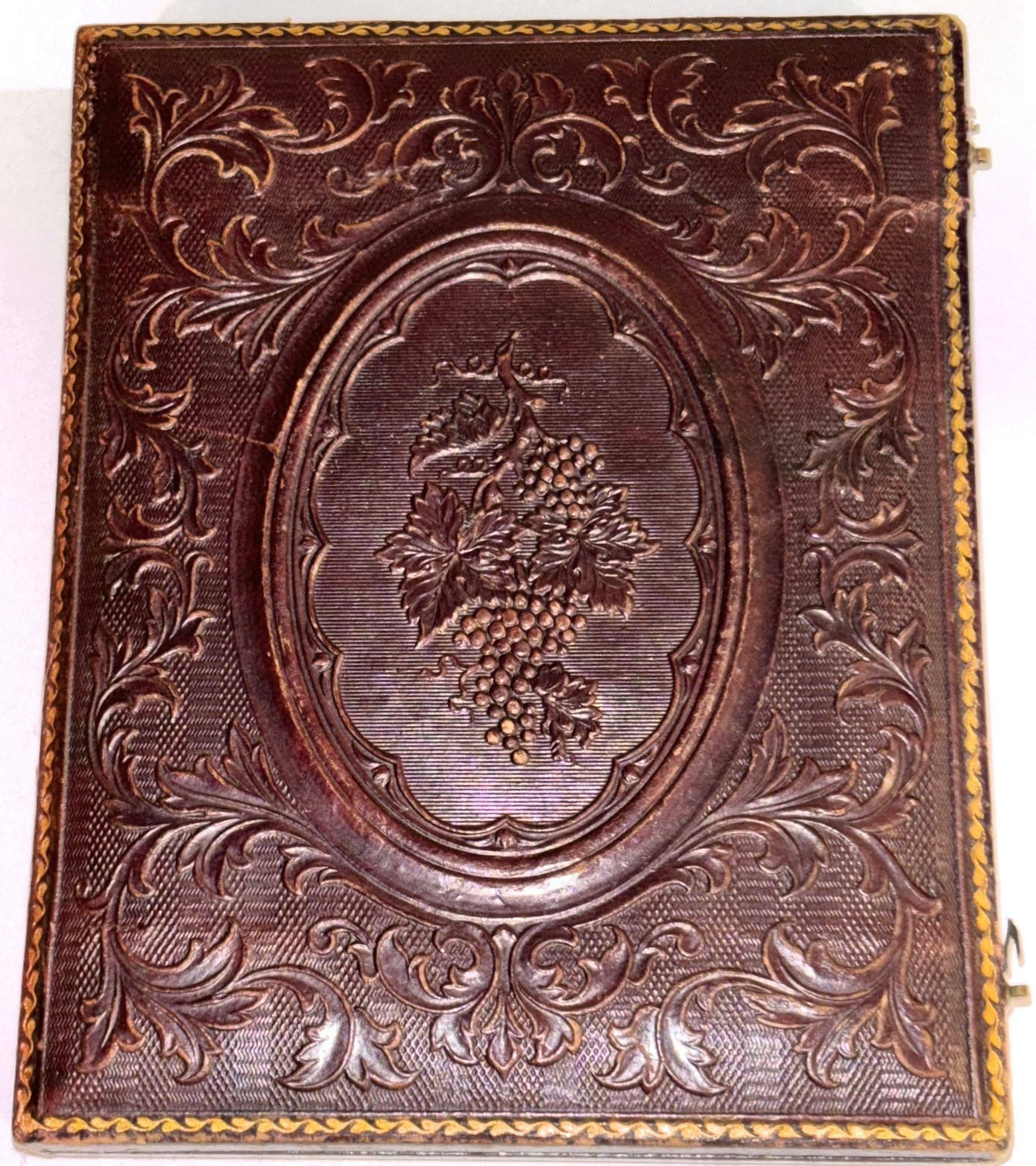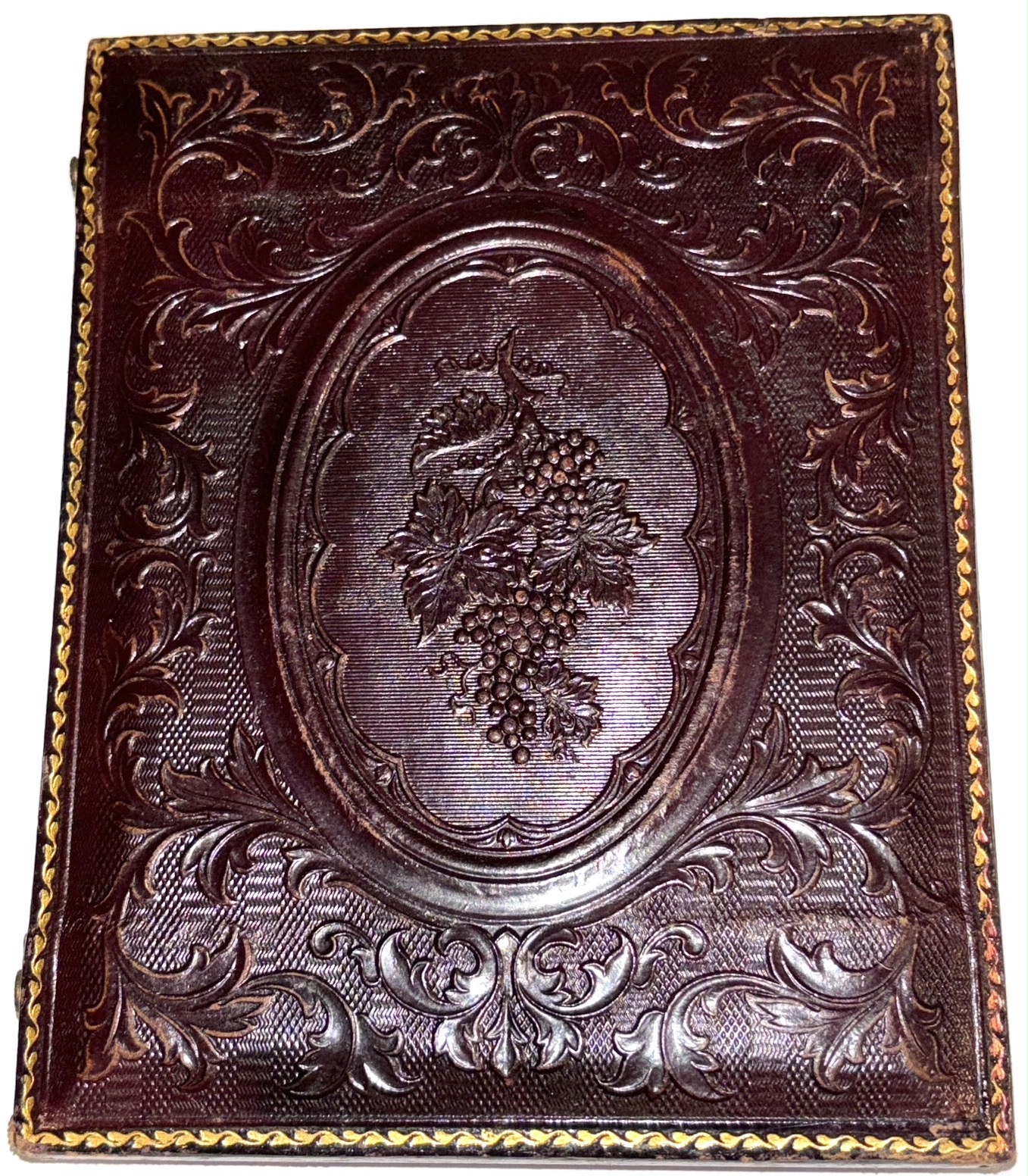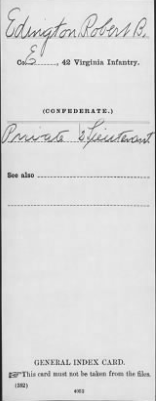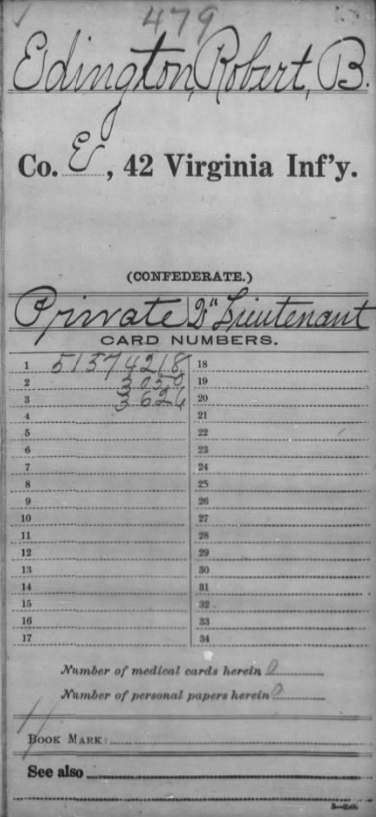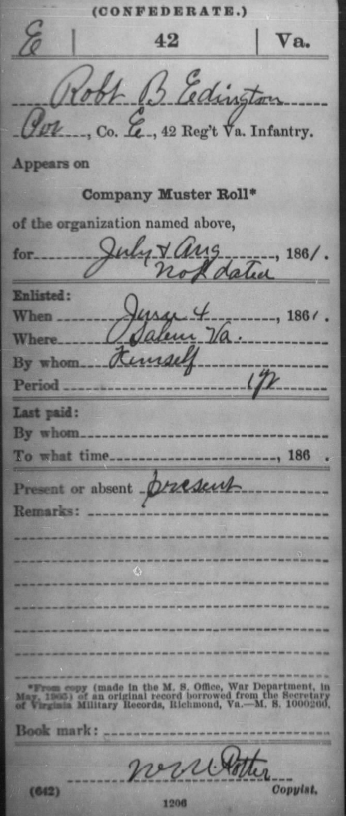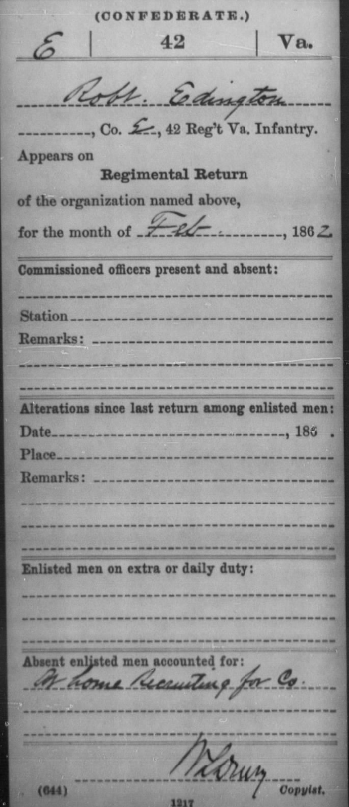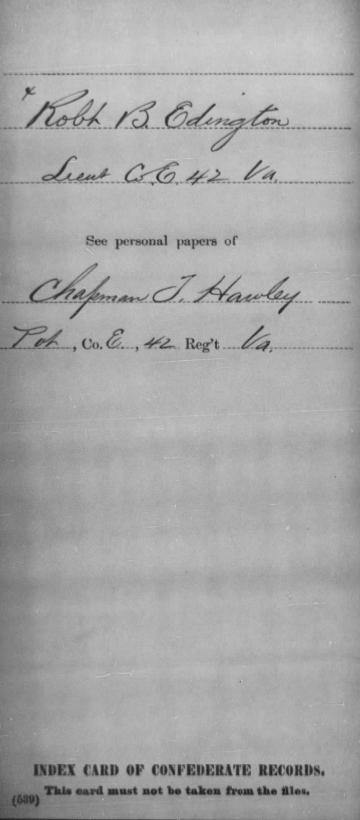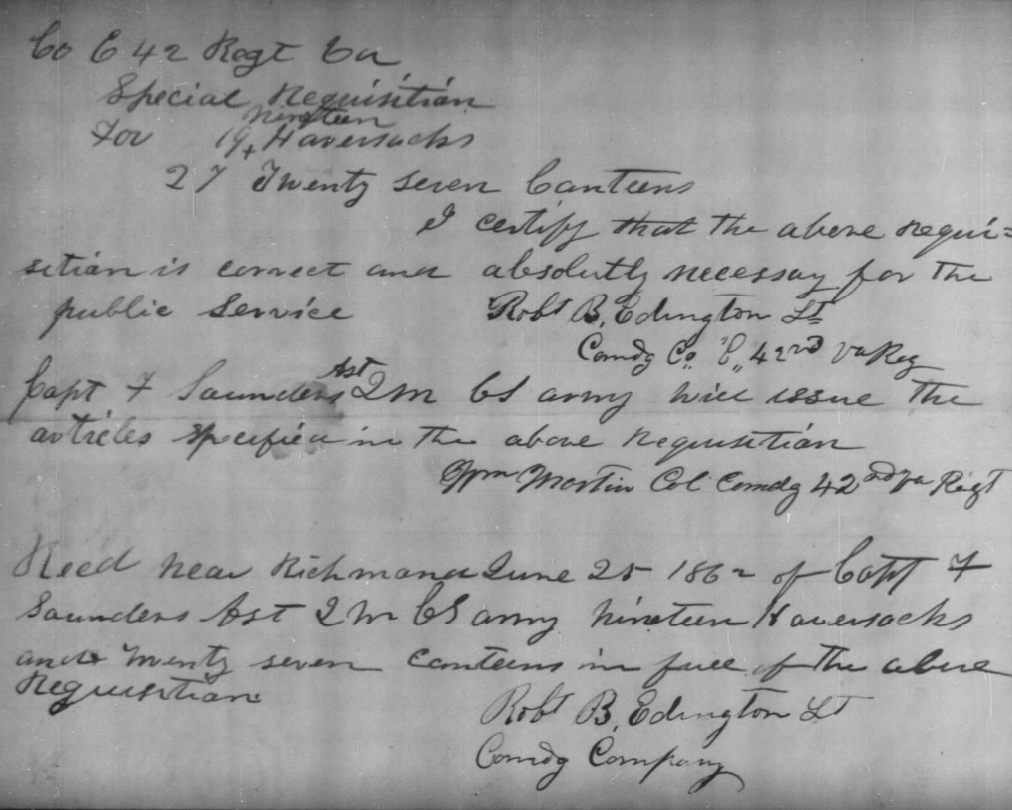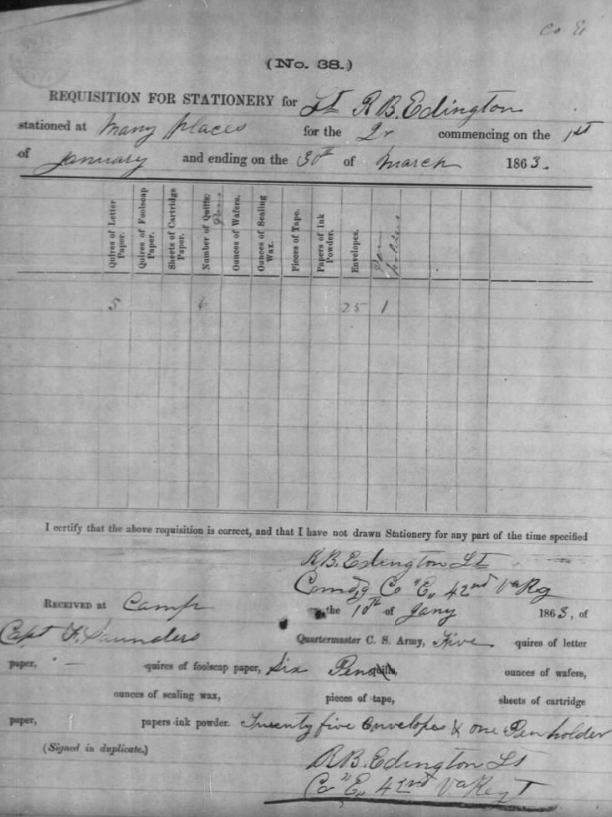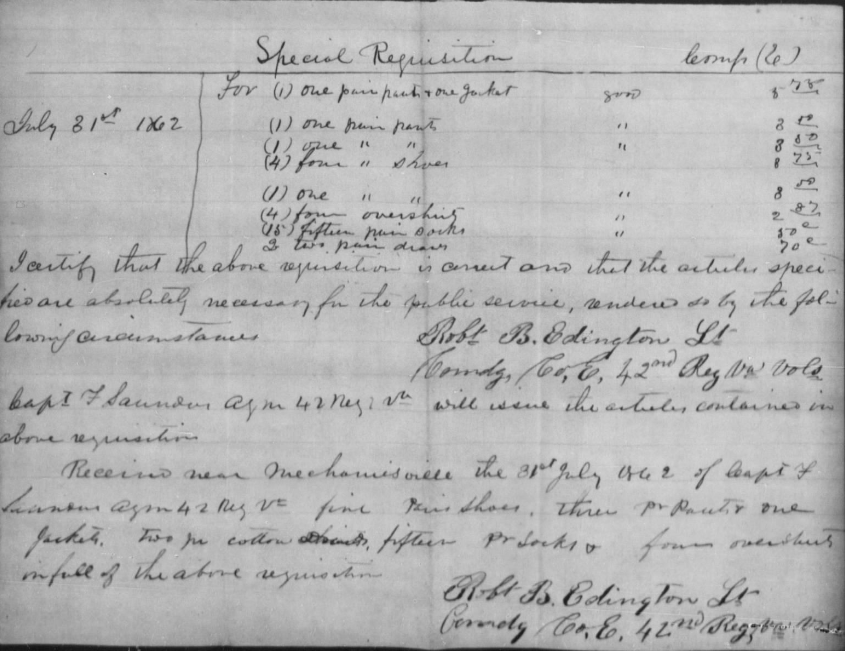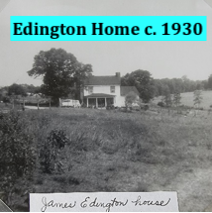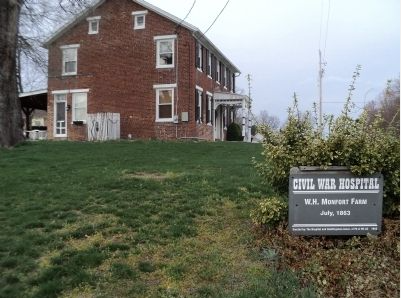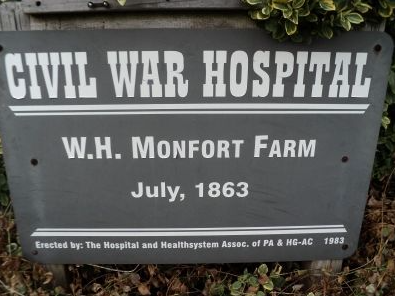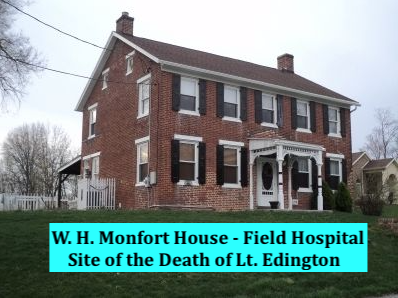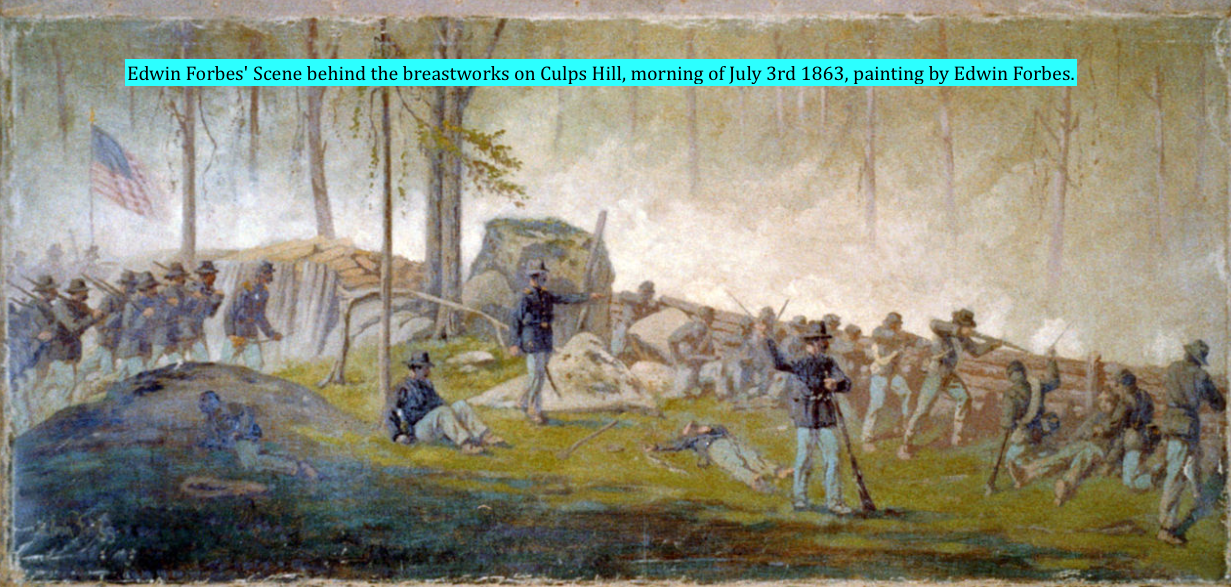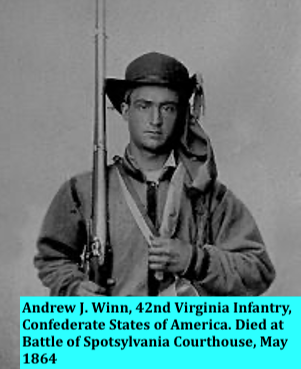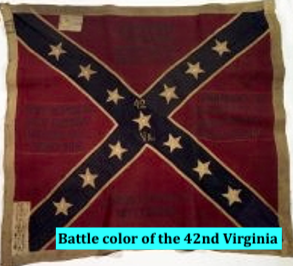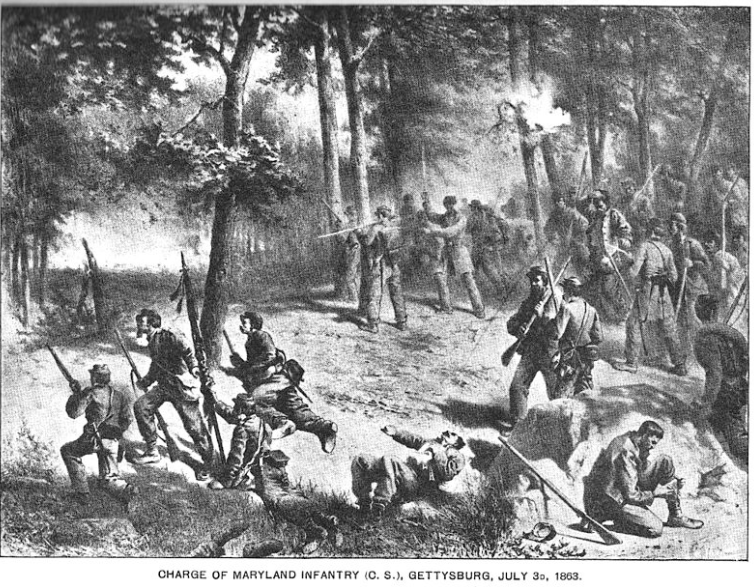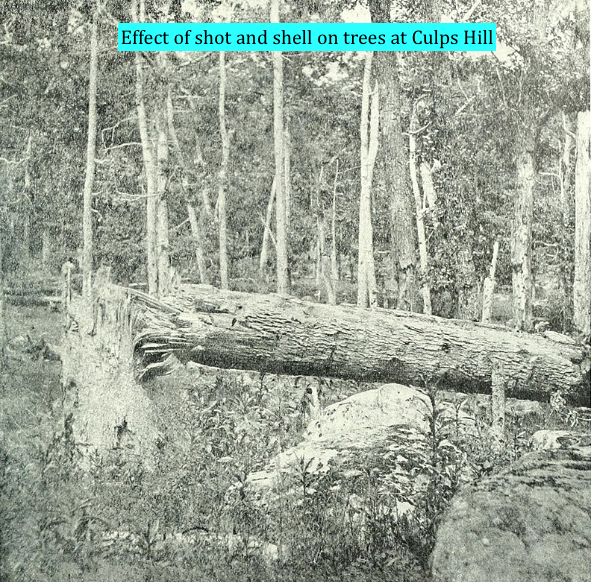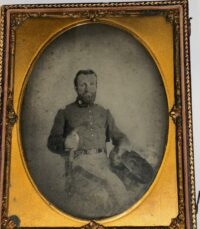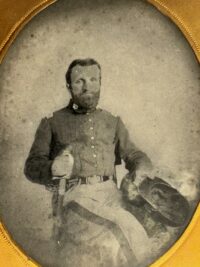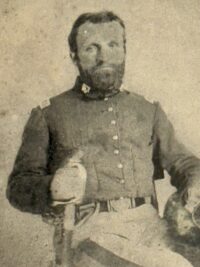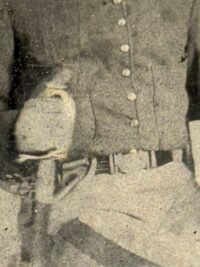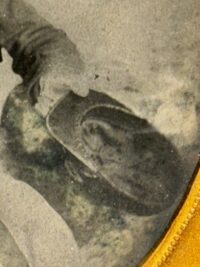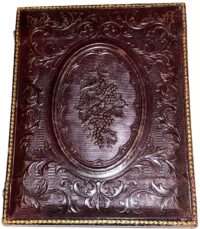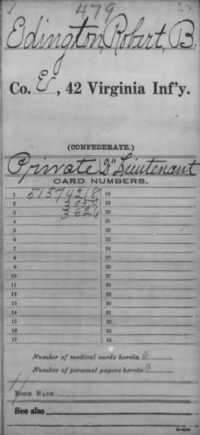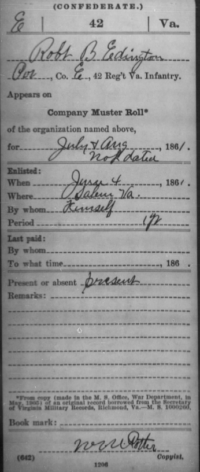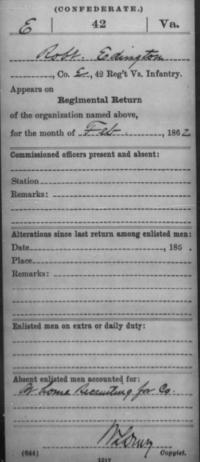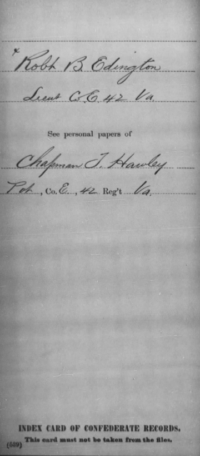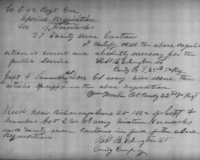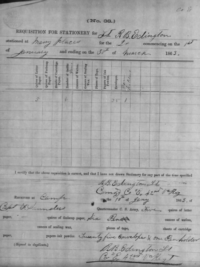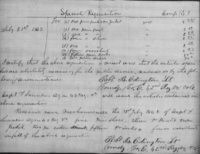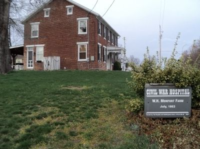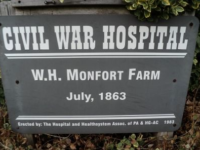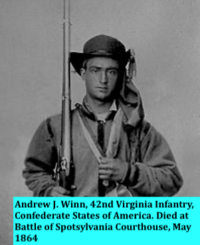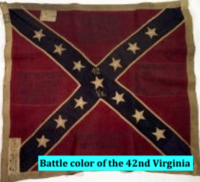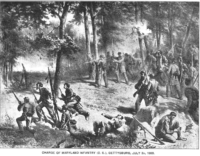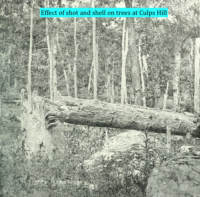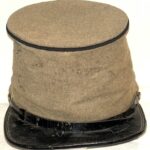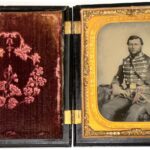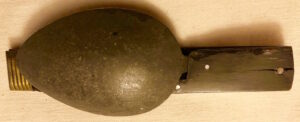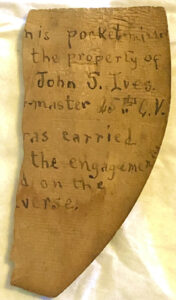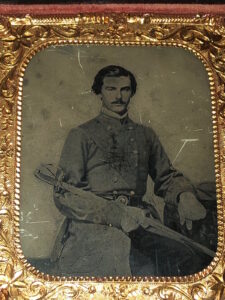Halfplate Ambrotype of Lieutenant Robert Burwell Edington, Company E, 42nd Virginia Infantry, “Dixie Grays” – Mortally Wounded at Gettysburg, July 3, 1863
$19,500
NEW PRICING! Halfplate Ambrotype of Lieutenant Robert Burwell Edington, Company E, 42nd Virginia Infantry, “Dixie Grays” – Mortally Wounded at Gettysburg, July 3, 1863 – This image, a half-plate relievo ambrotype, housed in a full leatherette case, is somewhat misty in appearance; it was probably taken in 1862, somewhere in Western Virginia. Robert Edington is enumerated, in period enlistment and census records, as a 19-year-old laborer, living at Roanoke Red Sulphur Springs, Roanoke County, Virginia, in 1861. Philip Eddington, family patriarch and grandfather of Robert B. Edington, and his family were people of wealth and influence and owned a number of slaves and several significant farms. Philip Edington’s grandsons were members of the local military entity, “The Dixie Grays.” Joseph Eddington, second Corporal, died in 1862 in a hospital. James P. Eddington, a private, was wounded in 1862 at Kernstown; Robert Burwell Edington entered the Confederate Army, at an unspecified rank, in the “Dixie Grays,” at Salem, Virginia; ultimately, the company would become Company E of the 42nd Virginia Infantry. Edington was elected 3rd Lieutenant of his company, on April 4, 1861.
In this striking image, Edington appears in an early war, Confederate, shell jacket, with a foot officer’s sword and what appears to be insignia on the collar and shoulders of his jacket. The single, wide branch of service stripe down his pants’ legs, are indicative of his rank as an NCO or junior officer. In an unusual aspect of his pose, Edington displays the underside of his kepi; he is wearing an early, rectangular, militia belt plate affixed to his sword belt. Edington’s record indicates that after his April 1862 promotion, he was in command of his company several times prior to the Battle of Gettysburg, in July 1863. Edington’s appearance in this photograph connotes his rank as that of a commissioned officer, indicating that the photograph was taken after his election to 3rd Lieutenant, in April 1862.
The 42nd Virginia fought in western Virginia from July through December 1861; thereafter, it participated in all of the major actions under the direction of General Thomas J. “Stonewall” Jackson, through the Battle of Chancellorsville, May 1-3, 1863. The regiment fought at Culps Hill, during the Battle of Gettysburg, as part of the Second Corps, under General Richard S. Ewell. During intense fighting on July 2, Edington was severely wounded and sent to the W. Henry Montford Farm where General Allegheny Johnson’s Division Hospital had been established. At this hospital, Edington succumbed to his wounds, on July 4. It is conceivable that Edington’s remains were transferred to Richmond’s Hollywood Cemetery, in the early postwar years, although no record exists to confirm that process.
The image is housed in a full, leatherette case. This ambrotype was held in the family collection of Bedford, Virginia, chief of police James Day.
Author and researcher Gregory Coco noted that “…on the W. H. Montford farm there are five distinctive places where burials were noted, one of which was under a locust tree opposite the barn.” Coco photographed the field where these graves were located and includes a photograph in his book Wasted Valor: The Confederate Dead at Gettysburg.
Robert B. Edington
Residence was not listed; Enlisted on 6/4/1861 at Salem as a Private. On 6/4/1861 he mustered into “E” Co. VA 42nd Infantry He died of wounds on 7/4/1863 at Gettysburg, PA He was listed as:* Detailed 2/28/1862 (place not stated) (For recruiting dity)* Wounded 7/2/1863 Gettysburg, PA Promotions:* 3rd Lieut 4/21/1862
|
42nd VA Infantry
| Organized: on 7/1/61 Mustered Out: 4/9/65 at Appomattox Court House |
| From | To | Brigade | Division | Corps | Army | Comment |
| Aug ’61 | Nov ’61 | Burks’ | Army of Northwest | |||
| Nov ’61 | Dec ’61 | Gilham’s | Loring’s | Army of Northwest | ||
| Dec ’61 | May ’62 | 2nd | Valley District | Dept of Northern Virginia | ||
| May ’62 | Jun ’62 | 2nd | Jackson’s | Valley District | Dept of Northern Virginia | |
| Jun ’62 | May ’64 | J.R. Jones’/J.M. Jones’ | Jackson’s/Trimble’s/Johnson’s | 2nd | Army of Northern Virginia | |
| May ’64 | Jun ’64 | Terry’s Consolidated | Gordon’s | 2nd | Army of Northern Virginia | |
| Jun ’64 | Dec ’64 | Terry’s Consolidated | Gordon’s | Valley District | Dept of Northern Virginia | |
| Dec ’64 | Apr ’65 | Terry’s Consolidated | Gordon’s | 2nd | Army of Northern Virginia |
| Name: | Robert B Edington | ||||||||||||||||||||||
| Gender: | Male | ||||||||||||||||||||||
| Race: | White | ||||||||||||||||||||||
| Residence Age: | 9 | ||||||||||||||||||||||
| Birth Date: | 1841 | ||||||||||||||||||||||
| Birthplace: | Virginia | ||||||||||||||||||||||
| Residence Date: | 1850 | ||||||||||||||||||||||
| Home in 1850: | District 57, Roanoke, Virginia, USA | ||||||||||||||||||||||
| Attended School: | Yes | ||||||||||||||||||||||
| Line Number: | 4 | ||||||||||||||||||||||
| Dwelling Number: | 598 | ||||||||||||||||||||||
| Family Number: | 598 | ||||||||||||||||||||||
| Household Members: |
|
Robert B. Edington
BIRTH
31 Oct 1841
Roanoke County, Virginia, USA
DEATH
4 Jul 1863 (aged 21)
Gettysburg, Adams County, Pennsylvania, USA
BURIAL
Roanoke County, Virginia
| Name | Robert B. Edington |
| Gender | Male |
| Birth Date | 31 Oct 1841 |
| Birth Place | Roanoke County, Virginia, United States of America |
| Death Date | 4 Jul 1863 |
| Death Place | Gettysburg, Adams County, Pennsylvania, United States of America |
| Cemetery | Edington Cemetery |
| Burial or Cremation Place | Roanoke County, Virginia, United States of America |
| Father | James Frank Edington |
| Mother | Louisa Edington |
42nd Regiment, Virginia Infantry
OVERVIEW:
42nd Infantry Regiment, organized at Staunton, Virginia, in July, 1861, recruited its members in Henry, Floyd, Bedford, Campbell, Roanoke, Patrick, and Franklin counties. After fighting at First Kernstown and in Jackson’s Valley Campaign, the unit was assigned to J.R. Jones’ and W. Terry’s Brigade, Army of Northern Virginia. It was active in many conflicts from the Seven Days’ Battles to Cold Harbor, then moved with Early to the Shenandoah Valley and was involved in the Appomattox operations. This regiment reported 70 casualties at First Kernstown and totalled 750 effectives in May, 1862. It sustained no losses during the Seven Days’ Battles but had many at Cedar Mountain. There were 62 disabled at Second Manassas, 26 at Fredericksburg, and 135 at Chancellorsville. Of the 265 engaged at Gettysburg, twenty-one percent were killed, wounded, or missing. Only 1 officer and 44 men surrendered. The field officers were Colonels Jesse S. Burks, Andrew J. Deyerle, John E. Penn, and R.W.Withers; Lieutenant Colonels Daniel A. Langhorne, William Martin, and Samuel H. Saunders; and Majors P.B. Adams, Henry Lane, and Jesse M. Richardson.
| 42nd Virginia Infantry Regiment | |
| Flag of Virginia, 1861 | |
| Active | July 1861 – April 1865 |
| Disbanded | April 1865 |
| Country | Confederacy |
| Allegiance | Confederate States of America |
| Branch | Confederate States Army |
| Type | Infantry |
| Engagements | American Civil War |
The 42nd Virginia Infantry Regiment was an infantry regiment raised in Virginia for service in the Confederate States Army during the American Civil War. It fought mostly with the Army of Northern Virginia.
Brunswick County native Andrew J. Winn, 42nd Virginia Infantry, Confederate States of America. Died at Battle of Spotsylvania Courthouse, May 1864
History
The 42nd Virginia, organized at Staunton, Virginia, in July 1861, recruited its members in Henry, Floyd, Bedford, Campbell, Roanoke, Patrick, and Franklin counties.
After fighting at First Kernstown and in Jackson’s Valley Campaign, the unit was assigned to J.R. Jones’ and W. Terry’s Brigade, Army of Northern Virginia. It was active in many conflicts from the Seven Days’ Battles to Cold Harbor, then moved with Early to the Shenandoah Valley and was involved in the Appomattox operations. This regiment reported 70 casualties at First Kernstown and totaled 750 effectives in May 1862. It sustained no losses during the Seven Days’ Battles but had many at Cedar Mountain. There were 62 disabled at Second Manassas, 26 at Fredericksburg, and 135 at Chancellorsville. Of the 265 engaged at Gettysburg, twenty-one percent were killed, wounded, or missing. Only 1 officer and 44 men surrendered.[1][2]
Field officers
The field officers were Colonels Jesse S. Burks, Andrew J. Deyerle, John E. Penn, and R. W. Withers; Lieutenant Colonels Daniel A. Langhorne, William Martin, and Samuel H. Saunders; and Majors P. B. Adams, Henry Lane, and Jesse M. Richardson.
42nd Virginia Infantry Regiment
| 1861 | |
| July | The 42nd Virginia Infantry Regiment was organized at Staunton for one years service under the command of Colonel Jesse S. Burks, Lieutenant Colonel D. A. Langhorne and Major Berbeck P. Adams.Company A (Henry Volunteers) – Henry County Company B (Floyd Guards) – Floyd County Company C (Buford Grays) – Bedford County Company D (Campbell-Lee Guards) Campbell County Company E (Dixie Grays) – Roanoke County Company F (Leatherwood Fencibles) – Henry County Company G (Second Company of Volunteers) – Henry County Company H (Patrick Henry Volunteers) – Patrick County Company I (Campbell Guards) – Campbell County Company K (Franklin Invincibles) – Franklin County |
| August-November | Assigned to Burks’s Brigade, Army of the Northwest |
| August-November | Assigned to Gilham’s Brigade, Loring’s Division, Army of the Northwest |
| December-May | Assigned to the 2nd Brigade, Jackson’s Division, Army of the Valley District. Colonel Burks took command of the brigade, while Lieutenant Colonel Langhorne commanded the regiment. |
| 1862 | |
| March 23 | Battle of Kernstown
The regiment lost 70 casualties. Colonel Burks was wounded and disabled. |
| April 23 | Lieutenant Colonel Langhorne and Major Adams were dropped in the reorganization. William T. Martin was elected lieutenant colonel. |
| May-June | Assigned to the 2nd Brigade, Jackson’s Division, Army of the Valley District. |
| May 8 | Battle of McDowell
The regiment lost3 men wounded. |
| May 25 | First Battle of Winchester
Major Henry Lane was wounded. |
| June-May ’64 | Assigned to the J.R. Jones’s-J.M. Jones’s Brigade, Jackson’s-Trimble’s-Johnson’s Division, Jackson’s Command-2nd Corps, Army of Northern Virginia. |
| June 8 | Battle of Cross Keyes |
| June 9 | Battle of Port Republic |
| July 1 | Battle of Malvern Hill |
| July 21 | Colonel Burks resigned due to disability from his Kernstown wound. |
| August 9 | Battle of Cedar Mountain |
| August 28-30 | Second Battle of Manassas (Bull Run)
The regiment lost 62 men. |
| September 10-12 | Siege of Harpers Ferry |
| September 17 | Battle of Sharpsburg (Antietam)
The regiment was commanded by Captain Robert W. Withers. He took over command of the brigade when Captain Page of the 21st Virginia was severely wounded. Captain David W. Garrett took over the regiment. From the War Department marker for Jones’ Brigade on the Antietam battlefield: On the evening of September 16, Jones’ Brigade formed line on the left of Winder’s, its right about 130 yards west of this, its left extending nearly to the West Woods. Skirmishers were advanced about 250 to 275 yards and became slightly engaged and the Brigade came under an annoying artillery fire. In this position it was attacked by Doubleday’s Division early in the morning of the 17th, and, after more than a half hour’s hard fighting, was forced back to the line held by the Brigades of Starke and Taliaferro. It was re-formed and, with Winder’s Brigade, supported the advance of Starke’s and Taliaferro’s Brigades a half hour later, but was again compelled to retire. Supported by Early’s brigade of Ewell’s Division, the entire Division again advanced and again fell back and reformed beyond the West Woods, where it supported the attack of McLaws’ Division on Sedgwick’s Federal Division. |
| December 13 | Battle of Fredericksburg
The 42nd Virginia lost 26 men. |
| 1863 | |
| April | Captain Robert W. Withers was promoted to lieutenant colonel, to rank from November of 1862. |
| May 1-4 | Battle of Chancellorsville
The regiment lost 135 men. |
| May 28 | Assigned to Jones’ Brigade of Johnston’s Division of the Second Corps of the Army of the Potomac. |
| July 1-3 | Battle of Gettysburg
The regiment was commanded by Lieutenant Colonel Robert Woodson Withers, and brought 265 men to the field. It lost 16 killed, 47 wounded and 26 missing or captured. Lieutenant Colonel Withers was wounded on July 2 attacking Culp’s Hill, and Captain Jesse M. Richardson took command. From the War Department marker for Jones’ Division on the Gettysburg battlefield: July 1. Arrived near nightfall and took position east of Rock Creek and north of Hanover road with pickets advanced to the front. July 2. About 4 P. M. moved forward to support artillery on Benner’s Hill. Crossed Rock Creek at 6 P. M. and assailed the Union position on the summit of Culp’s Hill charging up to the Union breastworks and continuing the struggle until dark. July 3. In line near here all day sometimes skirmishing heavily. About midnight moved with the Division and Corps to Seminary Ridge northwest of the town. July 4. Occupied Seminary Ridge. About 10 P. M. began the march to Hagerstown. |
| October | Bristoe Campaign.
Lieutenant Colonel Withers recovered from his Gettysburg wound and returned to command. |
| November | Mine Run Campaign |
| 1864 | |
| February | Lieutenant Colonel Withers was promoted to colonel. |
| May 5-6 | The Wilderness |
| May 8-21 | Spotsylvania Court House |
| May 12 | Most of the regiment was captured at the Muleshoe Salient along with the rest of Johnson’s Division |
| May 21 | The survivors of the regiment were consolidated with the rest of Jones’ brigade under Colonel Robert H. Dungan of the 48th Virginia. These and the survivors of Steuart’s Brigade and the Stonewall Brigade were consolidated into a brigade under Brigadier General William Terry in Gordon’s Division, 2nd Corps, Army of Northern Virginia. |
| May 22-26 | Battle of North Anna |
| June 1-3 | Cold Harbor |
| June | Shenandoah Valley Campaign
Sent to the Shenandoah Valley as part of Early’s Army of the Valley attached to Terry’s Consolidated Brigade, Gordon’s Division, Second Corps (Maj. Gen. John Breckinridge), Army of the Valley |
| June 17-18 | Battle of Lynchburg |
| June 19-21 | Pursuit of Hunter |
| June 22 | Day of rest at Salem |
| June 23-26 | Advance into the Shenandoah Valley to Staunton |
| June 28-July 2 | Advance from Staunton to near Harpers Ferry |
| July 5-6 | Crossed the Potomac at Boteler’s Ford and advances to west of Frederick |
| July 9 | Battle of Monocacy |
| July 10 | The advance on Washington continued through an extremely hot day. |
| July 11-12 | Battle of Fort Stevens |
| July 13-15 | Left Washington, crossed the Potomac at White’s Ford, and marched across Loudon County. |
| July 16 | Crossed the Blue Ridge at Snickers Gap to Berryville |
| July 19 | Moved to Strasburg |
| July 24 | Second Battle of Kernstown |
| August 8 | At Bunker Hill |
| August 10 | To Winchester |
| August 12 | To Fisher’s Hill |
| August 17 | Returned to Winchester and Bunker Hill. |
| August 22 | To Charles Town |
| August 25-26 | Feint toward Williamsport and return to Bunker Hill. Colonel Withers was wounded through the left lung and captured. |
| September 5 | To Winchester |
| September 19 | Third Battle of Winchester |
| September 22 | Battle of Fisher’s Hill |
| October 19 | Battle of Cedar Creek |
| November | Colonel Withers was exchanged but remained on sick leave in hospital at Lynchburg until the end of the war. |
| December | Petersburg Siege
The regiment returned from the Army of the Valley to Lee’s main army around Petersburg, attached to Terry’s Consolidated Brigade, Gordon’s Division (Brig. Gen. Clement Evans), Second Corps, Army of Northern Virginia. |
| 1865 | |
| February 5 | Battle of Hatcher’s Run |
| March 25 | Assault on Fort Stedman |
| April 6 | Battle of Sayler’s Creek |
| April 9 | Appomattox Court House
The 42nd Virginia surrendered 1 officer and 44 enlisted men. |


